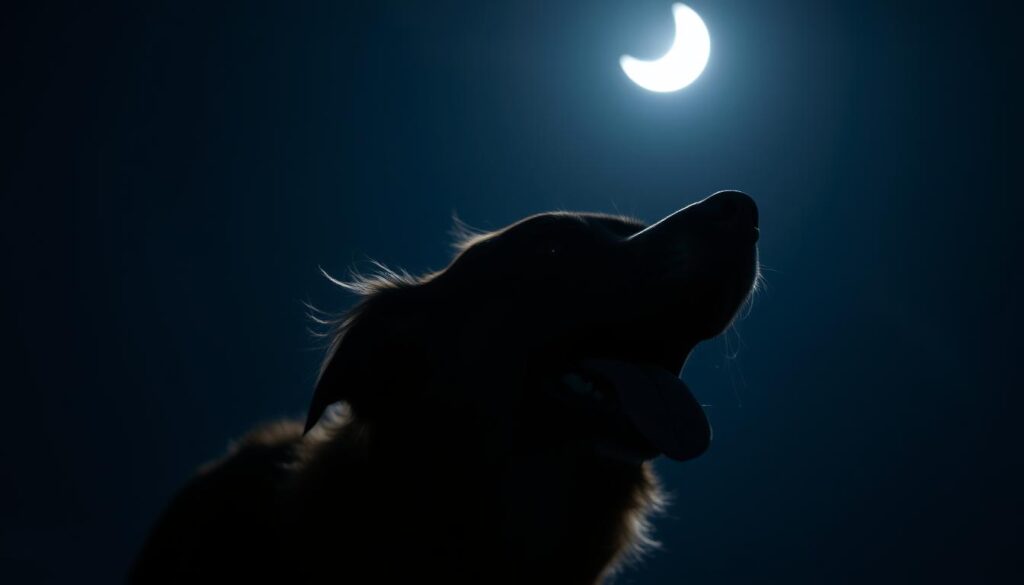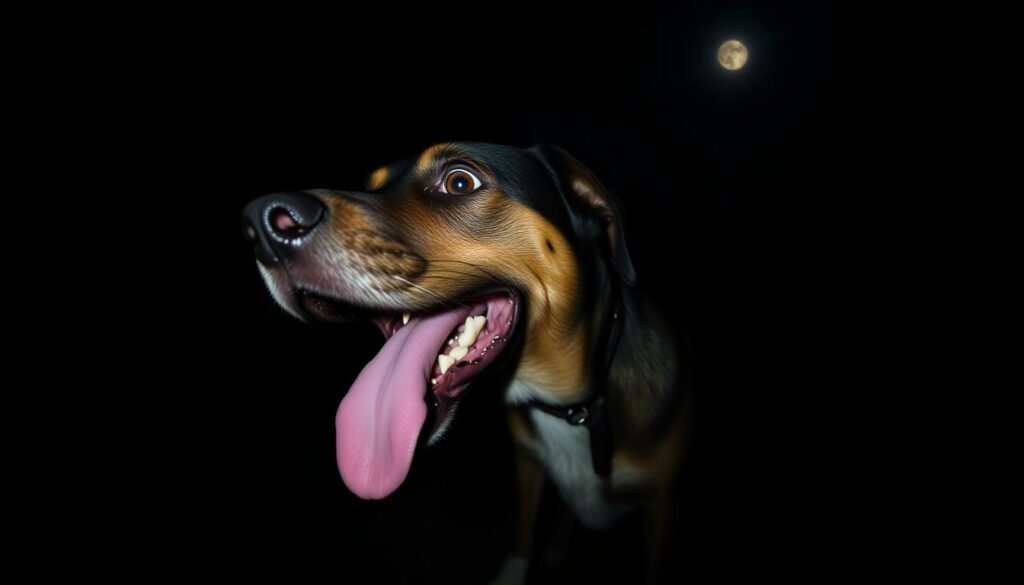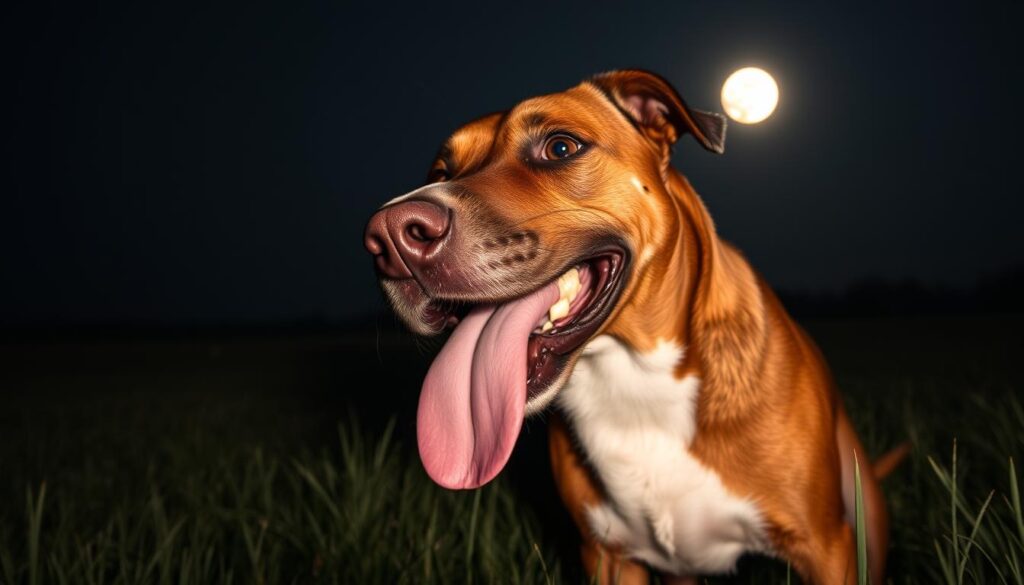As a dog owner, you might have seen your dog panting at night. You might wonder why this happens. Panting at night can be normal, but heavy breathing could mean there’s a health problem. Several things can cause your dog to pant at night, like keeping cool, feeling anxious, or being uncomfortable.

It’s important to know why your dog pants at night to keep them healthy. In this article, we’ll look at why dogs pant at night and how to help them sleep better. By spotting when your dog pants too much and fixing the cause, you can help them sleep well.
Introduction to Dog Panting
Dog panting at night might signal a bigger problem. It’s key to find out why to take good care of your dog. Knowing why your dog pants at night helps you prevent it and keep them happy and healthy.
Key Takeaways
- Dog panting at night can be normal, but too much panting might mean a health issue.
- Nighttime panting can be due to many reasons, like staying cool, feeling anxious, or being in pain.
- Understanding why your dog pants at night is crucial for their health and happiness.
- Spotting when your dog pants too much and fixing the cause can help them sleep better.
- By making their sleep space comfy and fixing health issues, you can cut down on nighttime panting.
- Dog breathing heavily at night can be a sign of a bigger issue, and it’s essential to identify the underlying causes to provide the best care for your dog.
Understanding Normal vs. Excessive Dog Panting at Night
As a dog owner, knowing the difference between normal and excessive panting is key. Normal panting shows a dog is hot or excited. Look for rapid breathing and a relaxed demeanor to spot it. But, too much panting might mean health issues like anxiety or breathing problems.
Reasons for dog panting at night include being too hot, stressed, or uncomfortable. To ease your dog’s panting, make sure they sleep in a cool and comfortable environment. Use calming techniques to reduce stress and ensure they’re physically comfortable. If worried, always check with a vet to rule out health problems.

Understanding and addressing dog panting at night can improve your dog’s sleep and health. Here are more tips to help:
- Give your dog lots of exercise during the day to lower stress and anxiety.
- Start a calming bedtime routine to help your dog relax.
- Watch your dog’s panting closely and get vet help if it’s too much or doesn’t stop.
Common Causes of Dog Panting at Night
As a dog owner, knowing why your dog pants at night is key. Excessive panting can mean there’s a problem. It’s important to find out why to help your dog.
Dogs pant for many reasons, like being too hot or feeling stressed. They might also pant if they’re not comfortable or if they’ve been active before bed.
Some main reasons for dog panting at night include:
- Temperature regulation: Dogs may pant at night due to a hot or humid environment, which can lead to excessive dog panting.
- Anxiety and stress: Dogs can experience anxiety and stress, leading to dog panting and restless at night.
- Physical discomfort: Discomfort or pain can cause dog panting while sleeping, making it essential to ensure your dog’s bed and surroundings are comfortable.
- Recent exercise: Engaging in strenuous exercise before bedtime can lead to dog panting at night, as your dog’s body tries to cool down and recover.
Knowing these reasons can help you make your dog’s sleep better. You might need to cool their space, use calming aids, or change their exercise schedule.

If your dog keeps panting or shows other signs of trouble, see a vet. They can check for health problems.
Environmental Factors That Cause Nighttime Panting
As a dog owner, you might have seen your dog panting at night. This can be due to several environmental factors. Temperature, humidity, and air quality play a big role. To help your dog sleep better, it’s key to think about these factors.
Using air purifiers and humidifiers can make your home more comfortable for your dog. These tools help control the temperature and humidity. They also improve the air quality, which can reduce panting at night.
- Keep your home at a comfortable temperature, between 68-72°F (20-22°C).
- Use a humidifier to maintain a humidity level between 30-50%.
- Ensure good air quality by using an air purifier and reducing dust and allergens in your home.
By following these steps, you can help your dog feel more comfortable at night. Remember, every dog is unique. So, keep an eye on how they react and adjust your approach as needed.
| Environmental Factor | Impact on Nighttime Panting |
|---|---|
| Temperature | High temperatures can increase panting, while low temperatures can reduce it. |
| Humidity | High humidity can exacerbate panting, while low humidity can alleviate it. |
| Air Quality | Poor air quality can trigger panting, while good air quality can reduce it. |
Medical Conditions Behind Heavy Breathing at Night
If your dog is breathing heavily at night, it might be due to a medical issue. It’s important to know what these issues are to help your dog. Heart problems are a common reason for heavy breathing in dogs.
Other reasons include respiratory issues like chronic bronchitis or pneumonia. Cushing’s disease, a hormonal disorder, can also cause panting. Pain or discomfort can also make your dog breathe heavily, so finding the cause is key.
Signs of these conditions include rapid breathing, coughing, and feeling tired. If you think your dog’s panting is due to a medical issue, see a vet. They can find the cause and help your dog feel better.
Heart Problems
Heart issues, like congestive heart failure, can make dogs breathe heavily. This happens when the heart can’t pump enough blood. Fluid builds up in the lungs, causing panting.
Respiratory Issues
Respiratory problems, like chronic bronchitis or pneumonia, can also cause heavy breathing. These conditions cause inflammation and congestion in the lungs. It makes it hard for your dog to breathe.
Cushing’s Disease
Cushing’s disease, a hormonal disorder, can cause panting at night. It happens when there’s too much cortisol. This hormone can cause heavy breathing, tiredness, and weight gain.
Pain or Discomfort
Pain or discomfort can also make your dog breathe heavily. It’s important to find out why. This could be due to arthritis, injury, or infection.
When Your Dog’s Nighttime Panting Requires Veterinary Attention
As a dog owner, watching your dog’s panting at night is key. Panting is normal, but too much can mean trouble. Knowing when to get vet help is crucial.
Look out for signs like fast breathing, blue gums, or trouble breathing. These mean your dog might need a vet. Panting can hint at heart or breathing problems, which need quick action.
Check if your dog’s panting is too much. Watch their breathing and behavior. If they’re panting a lot or seem stressed, get vet advice. Your vet can find out why and help manage the panting.
When judging your dog’s panting, consider these:
- Breathing rate: Dogs should breathe 10-30 times a minute. Faster than that might mean too much panting.
- Body language: If your dog is pacing or seems restless, their panting might be too much.
- Medical history: Dogs with heart or breathing issues often pant a lot.
By spotting excessive panting and getting vet help when needed, you keep your dog healthy. If you’re not sure about your dog’s panting or see odd symptoms, always talk to a vet. They can guide you on managing your dog’s nighttime panting.
Age-Related Factors in Dog Panting at Night
As your dog gets older, its breathing can change, leading to dog panting at night. It’s key to know these age-related factors to care for your dog well. Each life stage, from puppy to senior, has its own needs for nighttime dog panting.
A dog’s age affects its breathing a lot. Senior dogs might pant at night because of health issues like lung or heart problems. Puppies, on the other hand, pant at night because they’re full of energy and growing fast.
Senior Dog Considerations
Senior dogs go through natural changes that can impact their breathing. They might need more vet visits to keep an eye on their health and address dog panting at night issues.
Puppy Breathing Patterns
Puppies breathe differently, and their energy can cause nighttime dog panting. Make sure they get lots of play and exercise during the day to help them sleep better at night.
Adult Dog Normal Ranges
Adult dogs have set breathing patterns. It’s important to watch their nighttime dog panting for health signs. Knowing what’s normal for adult dogs helps you spot any problems and get vet help if needed.
Creating an Optimal Sleep Environment for Your Dog
To help your dog sleep better, create a quiet and comfy space. This means giving them a cozy bed, keeping it quiet, and sticking to a sleep schedule. A well-rested dog is less stressed and less likely to pant at night.
Here are some tips for a great sleep space for your dog:
- Provide a comfy and supportive bed
- Make the space quiet and peaceful
- Stick to a regular sleep schedule
- Keep the room at a comfy temperature
By following these tips, your dog will sleep better and feel happier. A good night’s sleep is key for their health and happiness.
Every dog is unique, so what works for one might not work for another. Paying attention to your dog’s needs can help create a relaxing sleep space. This can reduce stress and help them sleep better at night.
Natural Remedies and Solutions for Dog Panting at Night
Seeing your dog pant a lot at night can be worrying. Try changing their exercise time to avoid hard activities before bed. This simple change can help a lot in reducing panting and helping them relax.
Using calming methods like massage or aromatherapy can also help. Adding omega-3 fatty acids to their food can support their health. These natural remedies can make your dog feel better and reduce panting at night.
Exercise Timing Adjustments
- Avoid vigorous exercise within a few hours of bedtime
- Opt for gentle, relaxing activities, like short walks or playtime, before sleep
- Consider a morning or early afternoon exercise routine to help regulate your dog’s sleep patterns
Calming Techniques
Calming techniques can help reduce your dog’s stress and anxiety. This can lead to less panting at night. Some effective methods include:
- Massage therapy to relax your dog’s muscles and calm their mind
- Aromatherapy, using calming scents like lavender or chamomile, to create a soothing atmosphere
Dietary Considerations
A balanced diet is key for your dog’s health. It can help reduce panting at night. Adding supplements or changing their diet can support their well-being and reduce panting.
| Dietary Consideration | Benefits |
|---|---|
| Omega-3 fatty acids | Supports heart health and reduces inflammation |
| Antioxidant-rich foods | Helps protect against cell damage and promotes overall health |
By using these natural remedies, you can help your dog sleep better at night. Always talk to your vet before changing your dog’s diet or exercise routine.
Breed-Specific Considerations for Nighttime Panting
As a dog owner, it’s key to know that some breeds pant more at night. This is because of their physical traits. For example, pugs and bulldogs have short nasal passages. This can cause breathing problems and nighttime dog panting.
Some breeds are more likely to pant at night. Knowing this can help you care for your dog better. Here are some breed-specific things to consider:
- Brachycephalic Breeds: These breeds have short nasal passages. This makes them more likely to have breathing issues and pant.
- Large Breed Issues: Big dogs like Great Danes and Mastiffs might have joint pain. This can lead to dog panting at night.
- Small Dog Concerns: Small dogs, like Chihuahuas and Poodles, can get too hot or cold. This might cause nighttime dog panting.
Knowing about these breed-specific issues can help you find out why your dog pants at night. It also helps you make sure your dog is comfortable and healthy.
By understanding your dog’s breed needs, you can make their sleep better. This can help reduce nighttime dog panting. Always talk to your vet if you’re worried about your dog’s breathing or health.
| Breed Type | Potential Causes of Nighttime Panting |
|---|---|
| Brachycephalic Breeds | Short nasal passages, breathing difficulties |
| Large Breeds | Joint pain, discomfort |
| Small Breeds | Temperature sensitivity, overheating or overcooling |
Preventive Measures to Reduce Nighttime Panting
As a dog owner, it’s key to take steps to lower the chance of your dog breathing hard at night. Knowing why dogs pant at night helps you take the right steps. Keeping your dog at a healthy weight, exercising them regularly, and reducing stress can help a lot.
Some important strategies include:
- Ensuring your dog gets enough physical activity during the day to burn off excess energy
- Creating a calm and comfy sleep space to lessen stress
- Watching your dog’s weight and adjusting their diet if needed to avoid obesity
By adding these steps to your dog’s daily life, you can cut down on nighttime panting. This helps your dog stay healthy and happy. Remember, every dog is unique, so adjust your approach to fit your dog’s needs.
By being proactive and informed about your dog’s health, you can lower the risk of nighttime panting. This ensures your dog gets the restful sleep they need to do well.
Conclusion: Ensuring Your Dog’s Peaceful Night’s Rest
Managing your dog’s nighttime panting is key for their health. Understanding the causes and addressing them can help. Also, seek vet care when needed. Each dog is different, so watch for their unique needs and habits.
To help your dog sleep well, make their bed comfy. Adjust their exercise times and try calming methods. Watch their breathing and treat any health issues. With care, your dog can sleep soundly.
Follow this guide to give your dog the sleep they need. Focus on their sleep, and you’ll both feel great in the morning.
FAQ
Why does my dog pant at night?
Dogs pant at night for many reasons. They might be trying to cool down, feeling stressed or anxious, or in physical discomfort. It’s key to know when panting is normal and when it’s not.
What are the environmental factors that can cause nighttime panting?
Things like temperature, humidity, and air quality can make dogs pant at night. To help your dog sleep better, make sure their environment is comfortable. Use air purifiers and humidifiers to keep the air right.
What medical conditions can cause heavy breathing at night?
Heart issues, breathing problems, Cushing’s disease, and pain can all lead to heavy breathing at night. If you think your dog’s panting is a sign of illness, see a vet right away.
When does my dog’s nighttime panting require veterinary attention?
If your dog is breathing fast, has blue gums, or is having trouble breathing, get vet help fast. These signs can mean a serious health issue.
How can I create an optimal sleep environment for my dog?
For a good sleep spot, give your dog a comfy bed, keep it quiet, and stick to a sleep schedule. This helps them relax and can cut down on panting.
What natural remedies can help with dog panting at night?
To help with panting, try changing when you exercise your dog, use calming massages and scents, and think about what they eat. These can help them relax and breathe easier.
Are there breed-specific considerations for nighttime panting?
Yes, some breeds like pugs and bulldogs, and both big and small dogs, might pant more at night. They need special care to manage this.
What preventive measures can I take to reduce nighttime panting?
To cut down on panting, keep your dog at a healthy weight, exercise them regularly, and try to reduce stress. These steps can help them stay healthy and breathe better at night.
